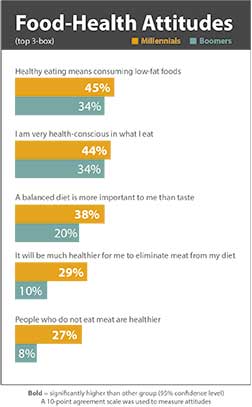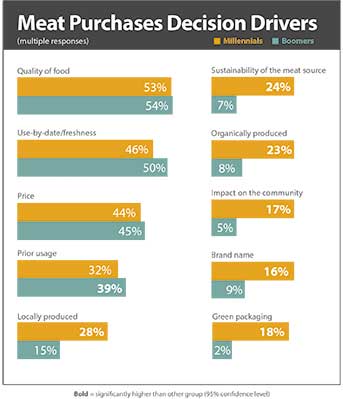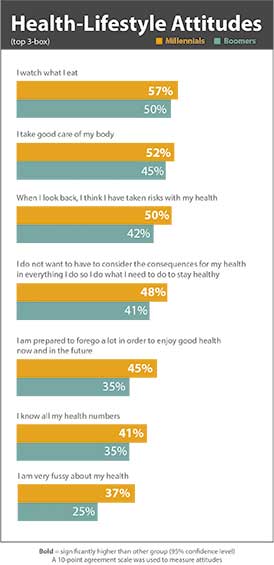Last updated on October 17th, 2016 at 03:11 pm
New research from Midan Marketing explores how Millennials’ meat consumption differs from that of Baby Boomers
*Editor’s note: This is the second of a two-part story, which is featured in its entirety in the September print editions of The Shelby Report. You also can read Part 1, where points 1-6 appear, here.
 7. Attitudes toward health as related to food: Millennials are more concerned about health as related to meat consumption
7. Attitudes toward health as related to food: Millennials are more concerned about health as related to meat consumption
Millennials’ views are more rigid than Boomers when it comes to health, nutrition and keeping meat as part of their diet. Unlike Boomers, Millennials are willing to sacrifice taste and modify their behavior if they believe these actions will have a positive long-term impact on their well-being.
8. Social attitudes toward meat: Millennials are more easily influenced
Some Millennials think that meat is becoming less socially acceptable (33 percent vs. 13 percent of Boomers) and in a social setting are much more likely than Boomers to adjust their meat consumption to align with the group (30 percent vs. 6 percent of Boomers).
 9. Meat purchase decision drivers: similar among both groups
9. Meat purchase decision drivers: similar among both groups
Top decision drivers are similar between Boomers and Millennials. However, Millennials value specific aspects of meat and meat production such as local, sustainable, organic, community impact and green packaging. While these are not the key drivers, they do impact their meat purchases.
10. Use of meat substitutes: Millennials are more likely to try meat substitutes than Boomers (43 percent vs. 12 percent)
More than four in 10 Millennials have consumed meat alternatives in the past 12 months. The most common meat alternatives used by Millennials are tofu (54 percent of those who tried meat alternatives), soy-based meat (52 percent) and texturized vegetable protein (40 percent).
11. Meat substitutes: different choices for Millennials and Boomers at lunch and dinner
At lunch time, Millennials substitute meat with grains such as rice, pasta or quinoa (49 percent); cheese (41 percent); beans (36 percent) and protein bars/shakes (27 percent). Boomers’ preferred substitute for meat is cheese (50 percent), followed by rice/pasta/quinoa (28 percent) and beans (21 percent).
At dinner time, however, rice/pasta/quinoa is the preferred choice for both groups (62 percent for Millennials and 73 percent for Boomers), followed by beans (42 percent of Millennials and 62 percent of Boomers).
 12. General attitudes toward health: Millennials are much more concerned than Boomers
12. General attitudes toward health: Millennials are much more concerned than Boomers
Millennials’ health concerns go beyond food. Health is a core value for them and they take their health very seriously. While both Millennials and Boomers view overall health as a priority, there are some significant differences between these two groups. Unlike Boomers, Millennials are prepared to make sacrifices to maintain their health. This “whatever it takes” attitude has a definitive impact on their lifestyle and their choices, including food choices.
As in other aspects of their lives, Millennials’ relationship with meat is on their own terms. True to form, they tend to eschew traditionally-held values in favor of their principles about health and wellness, the environment and social consciousness. These beliefs impact their perceptions of and attitudes toward meat, ultimately influencing their consumption.
Although Millennials are spending more on meat and their consumption is on the rise, the meat industry must take their unique characteristics and values into consideration to keep them as customers. Millennials’ relationship with meat is not exclusive; they may continue to explore meat substitutes if they believe that there are healthier alternatives to meat or if the meat industry does not offer the products that meet their needs.
In addition, Millennials will continue to demand more from the companies they support and the products they buy. If the meat industry does not communicate its commitment to sustainability, animal welfare, community impact and other issues that matter to Millennials, they will find substitutes that align with their view of a better world for themselves and their children.
This means that their commitment to meat is in the hands of the meat industry. Millennials seem to value causes over products, and this is a big departure from other generations’ attitudes. As long as the meat industry offers products that deliver on the attributes they hold dear, Millennials will remain loyal customers.
* * *
The Midan Marketing Story
Midan Marketing is an integrated marketing agency that was founded with a single goal in mind: to make fresh meat more relevant to consumers. Like many small businesses, Midan began as two people with an idea. Principals Danette Amstein and Michael Uetz began Midan in a small office above a garage and in a room below a stairwell in two different cities in October of 2004.
“Farming and ranching have always been near and dear to our hearts,” says Amstein. “Our goal wasn’t to grow into a nationally recognized agency—that was the result of continually fine-tuning our focus on quality client services.”
“Danette and I came into this business with a thought of what a company should be and how it should be run,” adds Uetz. “I think the culture we have created here is pretty unique.”
Midan’s roots in the meat industry run deep, starting with its principals. Both Uetz and Amstein have a lifelong love for the industry, having grown up on family farms. As adults, both held positions with the Beef Checkoff Program, first through the National Livestock & Meat Board and later the National Cattlemen’s Beef Association. Working on behalf of the more than 1 million cattle producers in the U.S., they developed successful marketing programs to stimulate beef demand and sales.
Eventually, they each went on to create their own marketing companies, often collaborating on products for the Beef Checkoff Program. In 2004, Amstein and Uetz joined forces to create Midan Marketing, a first-of-its-kind niche firm that combined their research, communication and marketing skills and capitalized on their years of experience in the meat industry. Even the name Midan is representative of their partnership and shared vision: “Mi” from Michael and “dan” from Danette.
Nearly 12 years after its inception, the meat marketing agency with an idea has grown to a staff of 30-plus with offices in Chicago and Mooresville, North Carolina. Many employees have ties to agriculture, with farming or ranching backgrounds that led them to study ag science in college and pursue careers in the agricultural industry.
“We think that the passion that our employees bring to the program, whether they are ‘ag kids’ or not, has created the difference and really helps us deliver premium results for our clients,” Uetz says.
Midan has worked closely with packers, processors, retailers, foodservice organizations, trade associations and government agencies to make a game-changing impact on the U.S. meat industry. The firm prides itself on its keen understanding of the complete meat supply channel, from farmer to consumer.
Today, Amstein and Uetz lead research, creative, public relations and account management teams to provide strategic vision and marketing for the meat industry.
“We live, breathe, eat, read about, write about and talk about meat,” says Amstein. “We’re always trying to figure out how to get consumers to include more meat in their diets and in their lifestyles.”
Midan Marketing has a vision for meat, and puts the full force of strategic planning, creative marketing, public relations and market research toward making meat more relevant to consumers. For more information, visit MidanMarketing.com.







2 Comments